
Decades of Denial: Policing’s Past Haunts the Present
Nationwide protests. Racist discrimination. Militarized police. These were the characteristics used to describe America during the long hot summer of 1967, when riots swept through more than 150 cities. They still describe America today, as the government has responded to protests against racist policing and immigration raids with militarized police forces backed by the Marines and the National Guard. It all sounds eerily similar to the America of more than half a century ago, when a presidential commission diagnosed the country’s problem: racism, particularly in policing, was causing widespread political unrest. “When a protest becomes that broad-based — cutting across gender lines and ethnic lines — then I think you have the opportunity to realize this is a true political movement,” says Rick Loessberg, an urban historian and the former planning commissioner for Dallas County, Texas, and the author of “Two Societies: The Rioting of 1967 and the Writing of the Kerner Report.”“This is not just a group or a segment of the population letting off steam,” says Loessberg, “which was what was one of the explanations that was used in the 1960s. This is something else that's much, much deeper and much more significant.”This week on The Intercept Briefing, host Akela Lacy speaks with Loessberg about what America learned — and didn’t learn — from our history of racist policing and political unrest.Listen to the full conversation of The Intercept Briefing on Apple Podcasts, Spotify, or wherever you listen.You can support our work at theintercept.com/join. Your donation, no matter the amount, makes a real difference. Hosted on Acast. See acast.com/privacy for more information.
1 Elo 26min
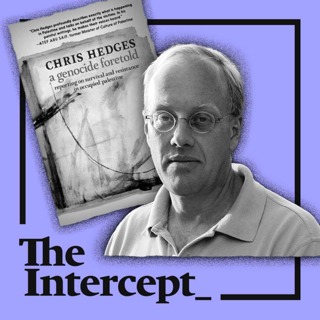
Starvation as a Weapon: Chris Hedges on Gaza
More than 1,000 Palestinians seeking food have been killed by Israeli forces in just the last few months, according to the United Nations. Israel’s blockade on aid, ongoing bombardment, and the dismantling of independent relief efforts have pushed Gaza to the brink of mass famine. At least 600,000 people are suffering from severe malnutrition, and aid groups warn of a manufactured humanitarian catastrophe.“It's not about the distribution of food, it's not about humanitarian aid. It's about creating — luring Palestinians who are desperate into the south, putting them into a closed military zone,” says Chris Hedges, the Pulitzer Prize-winning journalist and former Middle East bureau chief for the New York Times.This week on The Intercept Briefing, host Jordan Uhl speaks with Hedges about how we got here and what’s at stake. Hedges spent seven years covering the conflict between Israel and the Palestine, much of that time in Gaza. He’s the author of 14 books, the most recent being “The Greatest Evil Is War” and “A Genocide Foretold.”Listen to the full conversation of The Intercept Briefing on Apple Podcasts, Spotify, or wherever you listen.You can support our work at theintercept.com/join. Your donation, no matter the amount, makes a real difference. Hosted on Acast. See acast.com/privacy for more information.
25 Heinä 38min
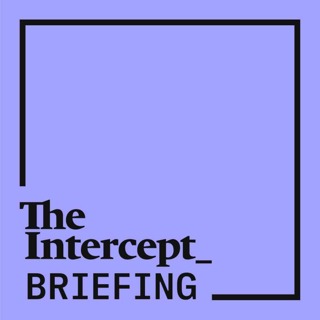
TRAILER: Executive Lawlessness: Leah Litman on the Supreme Court Enabling Presidential Overreach
This week on The Intercept Briefing, newsroom counsel and correspondent Shawn Musgrave speaks with professor and attorney Leah Litman and politics reporter Jessica Washington about how the Supreme Court’s right-wing supermajority is laying the legal foundation for unchecked executive lawlessness — and signaling to Trump that it won’t stand in his way. Listen to the full conversation of The Intercept Briefing on Apple Podcasts, Spotify, or wherever you listen. Hosted on Acast. See acast.com/privacy for more information.
21 Heinä 1min
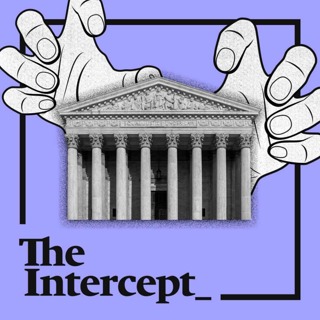
Executive Lawlessness: Leah Litman on the Supreme Court Enabling Presidential Overreach
During Donald Trump’s first term, the Supreme Court made some effort to check his power. But that era is over. The court has ruled that Trump cannot be prosecuted for actions he took as president, including for his role in the January 6 attack on the Capitol, and it just wrapped its latest term by restricting lower courts' power to block his unlawful orders on issues like birthright citizenship, abortion care, and immigrants’ basic rights. “What the Supreme Court did is it limited lower courts’ ability to use what has been the most effective tool that lower courts have to reign in the Trump administration's lawlessness, which is to block a policy on a nationwide basis,” says Leah Litman, author of the new book, “Lawless: How the Supreme Court Runs on Conservative Grievance, Fringe Theories, and Bad Vibes.” This week on The Intercept Briefing, newsroom counsel and correspondent Shawn Musgrave speaks with professor and attorney Litman and politics reporter Jessica Washington about how the Supreme Court’s right-wing supermajority is laying the legal foundation for unchecked executive lawlessness — and signaling to Trump that it won’t stand in his way. Listen to the full conversation of The Intercept Briefing on Apple Podcasts, Spotify, or wherever you listen. You can support our work at theintercept.com/join. Your donation, no matter the amount, makes a real difference. Hosted on Acast. See acast.com/privacy for more information.
18 Heinä 38min
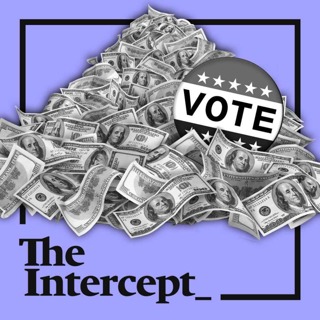
The Great American Heist You’re Paying For
On the Fourth of July, President Donald Trump signed into law a bill that constitutes one of the largest transfers of wealth in history — taking money away from working people and giving it to the nation’s elite. The bill is the culmination of years of giveaways that have allowed corporations and billionaires to tighten their grip on the government. The law triples the budget for Immigration and Customs Enforcement, slashes taxes for the most wealthy, and pays for it all by cutting health care for as many as 20 million people and gutting funding for public education and meals for school children. “ The reconciliation process goes hand-in-hand with all the executive orders that we've been seeing,” says Rep. Summer Lee, D-Pa. “It goes hand-in-hand with all of the different things that DOGE was pretending to uncover. It goes hand-in-hand with so much of Project 2025. So this is all just one kind of super villain packed into this — what they call this one big bill — that's like thousands of pages.” This week on The Intercept Briefing, Lee speaks to host Akela Lacy about what Democrats are doing to meet the moment and how they can break through Republican messaging on the bill. “ Democrats are screaming into a void,” Lee says. “The reality is that we have been talking about Medicaid, and it's very hard to break through in a 24-hour news cycle and this big bubble where we are in a sea of red coverage, conservative media, conservative narratives, disinformation, misinformation. And to break through in that moment takes more than just us.”At the heart of it all is one core problem: the power of money in politics, Lee says. She introduced a bill to ban super PACs, the kind of groups that helped elect Trump and have pushed Democrats to the right. “ You cannot have a democracy and super PACs,” Lee says. “If you are able to influence and shape the politics, shape information — what information gets out, which information doesn’t — because you have more money, then we don't have a level playing field.”You can hear the full conversation of The Intercept Briefing on Apple Podcasts, Spotify, or wherever you listen.You can support our work at theintercept.com/join. Your donation, no matter the amount, makes a real difference. Hosted on Acast. See acast.com/privacy for more information.
11 Heinä 51min
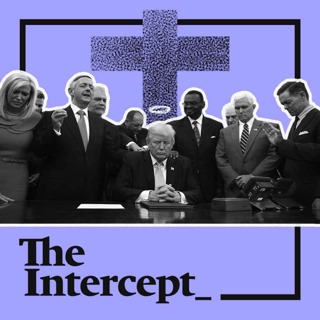
REBROADCAST: Trump’s Vision for America: I Am God
This week on The Intercept Briefing, we're re-sharing a conversation we first aired on March 7, 2025 – a conversation that’s only grown more relevant since it first aired. It’s a deep dive into the right-wing Christian ideologies shaping Donald Trump’s inner circle, featuring journalist and author of “Wild Faith,” Talia Lavin, and Intercept politics reporter Jessica Washington. As Trump consolidates power — with the backing of a hardline Congress and a Supreme Court increasingly aligned with his agenda — understanding the religious forces behind his movement is more important than ever.We’ll be back next week with a new episode. Hosted on Acast. See acast.com/privacy for more information.
4 Heinä 48min

TRAILER: Who’s the Real Bully of the Middle East?
This week on The Intercept Briefing, host Akela Lacy speaks to Iranian American author Hooman Majd about the Israel–Iran ceasefire, Trump’s role in escalating the conflict, and whether diplomacy can survive.Listen to the full episode of The Intercept Briefing on Apple Podcasts, Spotify, or wherever you listen. Hosted on Acast. See acast.com/privacy for more information.
1 Heinä 54s

Who’s the Real Bully of the Middle East?
A tenuous ceasefire between Israel and Iran announced Monday appears to be holding. President Donald Trump made the announcement after unilaterally dragging the U.S. into the conflict and authorizing strikes on three Iranian nuclear sites using 30,000-pound bunker busters. Israel attacked Iran on June 13, just days before Iran and the U.S. were set to resume talks in Oman over the country’s nuclear enrichment program.“ You don't have to be anti-war to understand that diplomacy in this case would've been better,” said Hooman Majd, an Iranian American writer and the author of three books on Iran. Majd is a contributor to NBC News and covered the 2015 Iran deal for the network. This week on The Intercept Briefing, Majd joins host Akela Lacy to discuss what's left of the path to diplomacy after years of sabotage, from Israel's aggressive military posture to Trump's withdrawal from the 2015 nuclear deal. You can hear the full conversation of The Intercept Briefing on Apple Podcasts, Spotify, or wherever you listen. Hosted on Acast. See acast.com/privacy for more information.
28 Kesä 45min






















